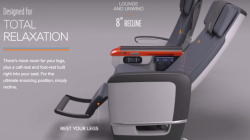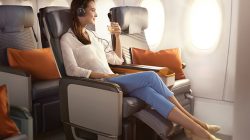Many airlines have policies based on exclusivity:
- Lounge access
- Priority Boarding
- Separate Check-in areas
What amount to premium fares are now a bundle of products and experience:
- Spa treatment
- Chauffeur service
- Amenity Kits with name brand products
- Overnight Hotel if in transit
- Espresso Machines
Exclusivity is defined differently by millennials and younger adults. Unique and personal experiences are valued, not being separate and special.
Take, for Instance, Domestic First Class
- I get to be that d-bag in the front of the plane that everyone glares at when they board.
- I don’t really need a wider seat.
- It’s not particularly easier to sleep or doze in these seats.
- The pitch is the same, most of the drinks are the same, I just don’t have to pay for them each time I want another.
I essentially can get the same experience in domestic first class by having silver status sitting in an exit row (a bundle of products in and of itself) bringing onboard a pizza from CPK and buying a drink or two (net cost $26) vs. buying up to the first class seat — so it’s a bit lost on me.
What’s more mind boggling is that, internationally, airlines have tons of premium inventory that goes out empty every day. For readers that have flown international three cabin F, when was the last time you were in a full cabin? Have you ever been the only passenger?
What the Airlines Say
When you talk to airline executives, they generally cite two reasons that premium cabin/ground services operate nowhere near capacity. One is cannibalization, that by giving access for free or at a reduced rate (miles) they are at risk of letting someone willing to pay the full amount off the hook.
This is classic revenue fencing and understandable behavior, but there is a way around it that’s better for passengers and better for airlines. We’ll get to that in a minute.
The less justifiable reason is “exclusivity” — this 1950’s era notion that the elite cannot be fraternizing or even in some cases even tangentially exposed to the unwashed masses. This goes back to my domestic first class example. Some people buy it because it provides a savings off the bundle of products it confers if they were purchased separately, but most people are doing it for ego. I probably have at some point.
Make Life in the Air like Life on the Ground
In many cases, airlines will refuse you access to a lot of things that people actually would be willing to pay for. Why not sell pajamas to economy customers for $50? On the ground, Gucci can. Why not offer business or first class catering for $100? On the ground, Morimoto can. Premium drinks for $13 each? On the ground, any half-decent cocktail bar can.
Instead of trying to create a hermetically-sealed experience where people live and die whether they get the whole can of coke vs. a 8 oz. cup, or fast vs. slow internet, why not try to replicate the real world outside? (For the life of me, why is Air France the only airline I know of that carries vermouth, when literally every other bar in the developed world has it?) Why do airlines make half nods to celebrity chefs or products I’ve never heard of (Oh, that wine on the menu retails for $7 a bottle, sure… you have a James Beard awarded sommelier you say…? Poor fellow.) when they could partner with truly leading brands and personalities.
If I want a fancy meal, I’ll go to an Alain Ducasse restaurant with a Michelin star. If I don’t — El Toro Tacqueria it is! If I want pajamas and an eye mask, I’ll buy pajamas and an eye mask!
Similarly, if I have a 8 hour layover in a foreign airport, why not in every case put a price on that lounge admission? $30-50 for mid-range lounges (KLM, LH), maybe $100 for the higher end ones (SQ, CX). Make them easy to find! Air France allows you to purchase first class ground experiences for 300 euro (great idea), but only if you have a business class ticket (terrible idea — turning down Y pax that may be willing to pay that) and know that they actually offer this service.
Are airlines secretly worried that a long-time paid first customer is going to complain that there are now 10 people in the F lounge instead of the usual 5? Is that same person entitled to complain about a full cabin if it was legitimately sold out – say a royal family bought every remaining seat. How does the airline respond? “Sorry, we actually have such a nice product that the elite from all over the the world flock to, making you less separate and special.”
The problem is often travelers don’t know they need these things until it’s too late and they’re past security or the aircraft door has closed. Airlines could do better to market procure these items at exactly the right time. Sleep items at the gate before a redeye? Gourmet coffee at 6 am!? The option to pre-buy a meal at check-in since you’re in an Uber and you know you’ll barely make the flight, but won’t have enough time to grab dinner in the lounge or terminal?
Back to the Supposed Cannibals
Now to avoid the revenue fencing and cannibalization problem mentioned above, you’d price these products and experiences in such a way that a fare is essentially a discount off the a la carte cost of the individual components. If you were to buy an economy ticket + seat upgrade + priority boarding + lounge access + chauffeur service + expedited arrival service, it should cost dearly more than a premium economy or business class ticket. Then you have effectively revenue fenced. The people who place an outsized value on those individual services and are willing to pay more for them are segmented and catered to. Compare this to the typical business or first class passenger who likely isn’t even aware of half of the benefits conferred to them as a result of their purchased ticket.
There are many cases in which I’d rather have a good meal at the airport, or maybe have the airline arrange my transport (or hotel during an overnight transit!), but I don’t need a flat bed seat or ANOTHER five or ten course meal just after departure, just a economy seat for flights under 6 hours will do (and maybe I do need that bed overnight). Side note: Why aren’t redeye flat bed seats priced differently than daytime flights with flat beds?
Monetization Means Competition! and Profits!
Partly what monetizing exclusivity does is also force the individual components of the product into the harsh limelight of competition. Hamburgers at the Concorde Room still terrible? Person paying $300 to access it probably has a more directed complaint than one who just came off a 10 hour flight and was too full to take more than one bite or didn’t even know the lounge was there. Maybe it would prompt British Airways to offer really amazing hamburgers that people would actually stand in line and pay for. Some restaurants have achieved that, and they’re probably more profitable than British Airways.
As far as carriers go, the only one that has made firm commitments to discretizing the entire experience is Delta, though others are getting better at this. They have made it their goal to monetize the forward cabin, and they’ve largely done a good job, increasing the amount of paid F traffic domestically from 11% to upwards of 50%. This means reducing prices and lowering the exclusivity of it.
I love the idea of Medallion choice benefits instead of hoping the airline picks benefits that I also value. Instead of free upgrades for being a super-elite fat cat customer, you might actually have a shot at seats up front at an affordable (still expensive, but less so) upgrade for your honeymoon or for that special vacation and a lounge you actually might WANT to pay $50 to access the one time a year you’re stranded in the airport for 8 hours. No part of the experience is inaccessible if you’re willing to pay for it, much like most of the rest of the world. Choice and personalized beats exclusive and special every time.
A Voice from Above?
Shareholders should also rejoice and embrace this concept, because it turns out, selling cocktails, business class meals and chauffeur service very likely now carries higher margins than air tickets. Go figure.
If anything, by starting to put price tags on these individual products and services, elite status and high revenue fare travelers might better understand the value they are getting for their loyalty or their large wallets, while the rest of us will get access to a much more personalized and tailored experience based on OUR definition of an optimal flying experience, not the airlines. It encourages them to compete on quality when substitutes increasingly abound and resets regular joe passengers expectations to work WITH the airline to define their own experience instead of simply enduring it in disgust.
That bodes well, because in this day and age, I’m perfectly happy with “having it my way” because even if I won’t necessarily go to the Private Room over Burger King, I should still have the option to.


